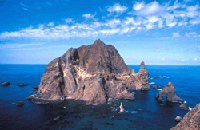South Korea warns of possible clash at sea with Japan as talks continue on disputed islets
Japanese and South Korean negotiators raced to avert a clash over a set of disputed islets on Thursday as Seoul accused Tokyo of neocolonial ambitions and warned of a possible confrontation at sea.

Behind-the-scenes talks on a diplomatic solution came even as tensions mounted over a Japanese plan to survey resource-rich waters near the islands, which are occupied by South Korea but claimed by Japan.
Some 20 South Korean gunboats have been dispatched to the area in anticipation of the arrival of Japanese survey ships. The ships were scheduled to conduct high seas seizure drills Thursday, but delayed the exercises due to bad weather, said Jang Soo-pyo, a South Korean Coast Guard official.
In Seoul, Foreign Ministry spokesman Choo Kyu-ho warned of the possibility of a clash and said Japan held the "key" to preventing conflict.
President Roh Moo-hyun meanwhile underscored the Korean protests by accusing Tokyo of harboring imperialistic ambitions. Many South Koreans consider Japan's claim a result of its 1910-45 colonial rule of the Korean Peninsula.
"There are some people claiming territorial rights to former colonies that were once acquired through a war of aggression," Roh said in a speech at a breakfast prayer meeting of Christian leaders in Seoul.
"We are now in a difficult situation," he said. "Problems cannot be solved just by goodwill, and we need wisdom and courage."
In Tokyo, Chief Cabinet Secretary Shinzo Abe said there had been "unofficial" contacts between the two sides, following media reports that Tokyo had offered to halt the survey if Seoul dropped efforts to add or change place names in the area.
Abe, however, said Japan planned to go ahead with the project.
"The Japanese coast guard is carrying out preparations to conduct a maritime survey that is based on international law," he said. "A calm response is necessary, and unofficial contacts between Japan and South Korea are taking place with the aim of a peaceful resolution."
Two survey ships left port on Japan's west coast on Wednesday but have been lingering offshore since, Coast Guard official Masayuki Fujita said. News reports said the survey may begin later Thursday.
The rocky outcroppings, called Dokdo by Koreans and Takeshima in Japan, are surrounded by rich fishing waters and both countries claim the area as part of their exclusive economic zones.
Korea Gas Corp. estimates the area has also enough methane hydrate deposits to meet South Korean natural gas demands for 30 years. It plans to start drilling in the region next year to assess the size of the deposits.
Foreign Minister Taro Aso told an upper house foreign and defense affairs committee Thursday that the survey is allowed under international laws and that Japan needs to do it to protect national interests.
"Japan cannot just sit around quietly," Aso said, especially given that South Korea has conducted "three to four" maritime surveys in the region, and with an international conference on naming bodies of water coming up in June.
Japanese newspapers reported Thursday that Tokyo offered to drop its survey plans if Seoul agreed to not register Korean place names in the disputed waters, including a proposal to rename the Sea of Japan. Some undersea basins and ridges are not yet named.
Foreign Ministry officials from both countries declined to comment on the reports.
Japan will further dispatch its vessels depending on the outcome of diplomatic efforts, Aso said. South Korean Foreign Minister Ban Ki-moon summoned Japanese Ambassador Shotaro Oshima early Thursday for talks.
"We are conducting diplomatic contacts, including those of ambassadors, so that we can resolve the problem peacefully," Aso said.
South Korea filed a declaration with the United Nations stating it would reject any attempt to settle the matter in an international court. Japan's Foreign Ministry said they had no immediate plans to seek the help of courts.
About 200 riot police were guarding the Japanese Embassy in Seoul as a small group of 30 demonstrators demanded Japan abandon its survey ambitions, chanting "Dokdo is our territory!" About a dozen fishery workers later failed in an attempt to storm the compound.
"It's a clear violation of South Korean sovereignty and South Korea should never compromise," said Rev. Han Sang-yol, one of the demonstrators.
The island dispute marks further deterioration in ties between the two countries, which have struggled for years to overcome their centuries-long history of animosity.
In addition to the islet feud, the two sides are at odds over Japanese Prime Minister Junichiro Koizumi's repeated visits to a war shrine that critics, Seoul included, consider a glorification of Japan's past imperialist ambitions, the AP says.
Subscribe to Pravda.Ru Telegram channel, Facebook, RSS!


